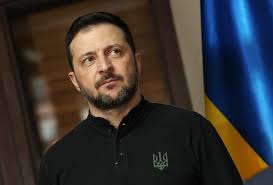Ukrainian President Volodymyr Zelenskyy has made a critical decision to reject a proposal put forth by Trump administration officials that would have granted the United States substantial access to Ukraine's rare earth minerals. This move comes amidst a backdrop of escalating tensions and strategic negotiations between the two nations. Zelenskyy's refusal reflects his concerns regarding the proposed agreement's lack of adequate security guarantees for Ukraine.
The initial proposal, crafted by Treasury Secretary Scott Bessent, aimed to secure the United States a 50% ownership stake in Ukraine's valuable rare earth minerals. This offer was portrayed as a token of appreciation for the unwavering support extended by Washington to Kyiv throughout its ongoing conflict with Russia. However, the Ukrainian President stood firm, expressing reservations about the deal's ability to safeguard Ukraine's best interests.
At the recent Munich Security Conference, Zelenskyy articulated his stance on the matter, highlighting the need for a comprehensive agreement that not only benefits both parties economically but also ensures Ukraine's security and sovereignty. The complexities of the proposed arrangement and its potential impact on Ukraine's strategic interests are at the forefront of these crucial negotiations.
In response to Zelenskyy's decision, a U.S. official criticized the Ukrainian President's rejection as "short-sighted," emphasizing the importance of forging enduring economic ties with the United States as a safeguard against future aggression. The interplay of economic incentives and security considerations has underscored the significance of this diplomatic stalemate for both nations.
Furthermore, there are indications that the proposal included provisions for potentially deploying American troops in Ukraine to safeguard the mineral reserves, contingent upon reaching a peace agreement with Russia. This layered approach underscores the intricate geopolitical dynamics at play and the multifaceted considerations that are shaping the negotiations between the two countries.
The abundance of rare earth minerals in Ukraine, such as titanium and iron ore, holds significant strategic value given their essential role in various technological applications. However, the challenge lies in ensuring that the exploitation of these resources aligns with Ukraine's broader national interests and security imperatives, prompting Zelenskyy to tread cautiously in navigating this delicate terrain.
The evolving discourse surrounding these negotiations, coupled with the divergent perspectives of the involved parties, underscores the complexity of geopolitical relations in the contemporary landscape. As these deliberations unfold, the stakes are high for both Ukraine and the United States, as they seek to balance economic incentives with strategic imperatives in a volatile geopolitical environment.
On a broader international scale, the implications of these negotiations reverberate beyond the immediate interests of the involved parties, potentially reshaping regional power dynamics and influencing broader geopolitical trends. The standoff between Zelenskyy and the Trump administration encapsulates the intricate interplay between economic interdependence, security considerations, and national sovereignty in the realm of contemporary diplomacy.


